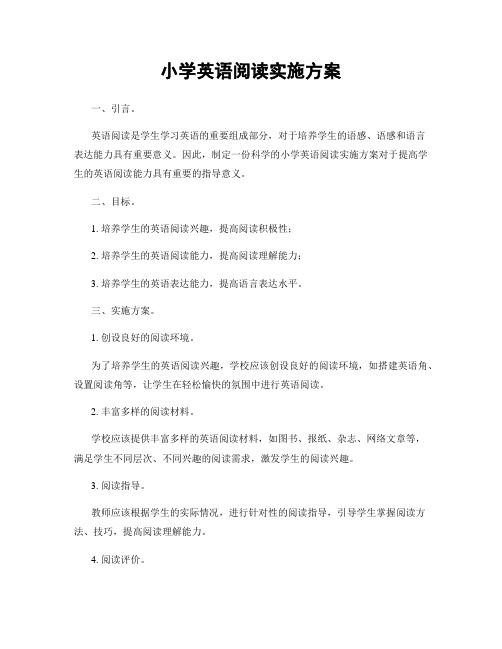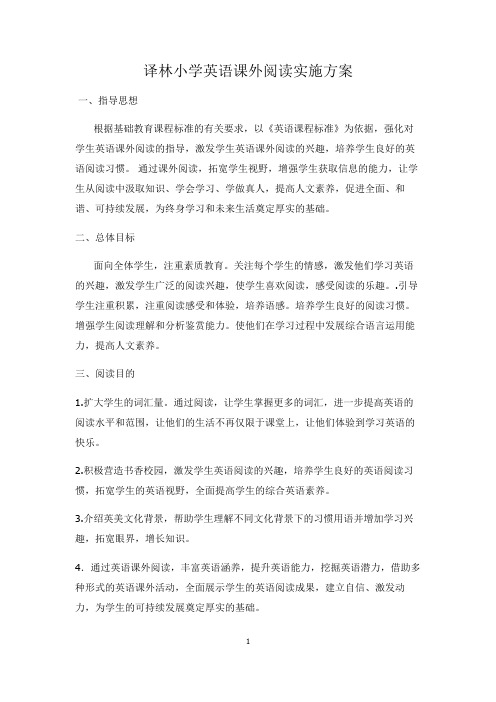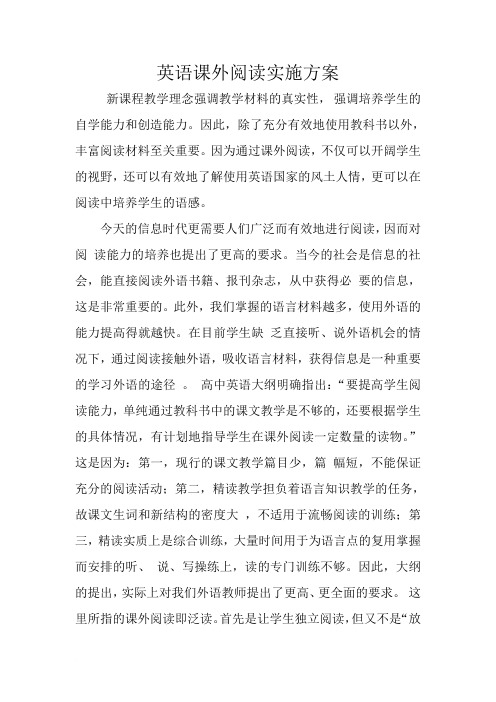(完整版)晒书城小学英语课外阅读实施方案
小学英语阅读实施方案

小学英语阅读实施方案一、引言。
英语阅读是学生学习英语的重要组成部分,对于培养学生的语感、语感和语言表达能力具有重要意义。
因此,制定一份科学的小学英语阅读实施方案对于提高学生的英语阅读能力具有重要的指导意义。
二、目标。
1. 培养学生的英语阅读兴趣,提高阅读积极性;2. 培养学生的英语阅读能力,提高阅读理解能力;3. 培养学生的英语表达能力,提高语言表达水平。
三、实施方案。
1. 创设良好的阅读环境。
为了培养学生的英语阅读兴趣,学校应该创设良好的阅读环境,如搭建英语角、设置阅读角等,让学生在轻松愉快的氛围中进行英语阅读。
2. 丰富多样的阅读材料。
学校应该提供丰富多样的英语阅读材料,如图书、报纸、杂志、网络文章等,满足学生不同层次、不同兴趣的阅读需求,激发学生的阅读兴趣。
3. 阅读指导。
教师应该根据学生的实际情况,进行针对性的阅读指导,引导学生掌握阅读方法、技巧,提高阅读理解能力。
4. 阅读评价。
学校应该建立科学合理的阅读评价机制,对学生的阅读情况进行定期评估,及时发现问题,采取有效措施加以解决。
5. 课外拓展。
学校可以组织各种形式的英语阅读活动,如朗读比赛、读书分享会等,拓展学生的英语阅读空间,提高学生的英语阅读能力。
四、实施效果。
通过以上实施方案的落实,学校将会取得以下效果:1. 学生的英语阅读兴趣得到提高,阅读积极性明显增强;2. 学生的英语阅读能力得到提高,阅读理解能力明显提升;3. 学生的英语表达能力得到提高,语言表达水平明显提高。
五、结语。
制定一份科学的小学英语阅读实施方案对于提高学生的英语阅读能力具有重要的指导意义。
学校应该根据学生的实际情况,科学制定并认真落实英语阅读实施方案,不断提高学生的英语阅读能力,为学生的英语学习打下坚实的基础。
(完整版)晒书城小学英语课外阅读实施方案

晒书城小学英语课外阅读活动实施方案一、指导思想为全面贯彻党的十八大精神,落实《义务教育英语课程标准》和《普通高中英语课程标准》要求, 强化对学生英语课外阅读的指导,帮助学生养成良好的阅读习惯;提高学生用英语获取信息、处理信息、分析问题和解决问题的能力;让学生从阅读中汲取知识、学会学习、提高人文素养,进一步拓宽国际视野,增强爱国主义精神和民族使命感,形成健全的情感、态度、价值观,为未来发展和终身学习奠定良好的基础。
二、具体目标1. 激发学生阅读的兴趣,使学生喜欢阅读,感受阅读的乐趣。
2. 帮助学生掌握精读、略读等阅读方法。
3. 扩展学生阅读面,增加阅读量,使学生多读书,读好书。
4. 培养学生写摘记和读书心得的良好阅读习惯。
5. 引导学生注重积累,注重阅读感受和体验,培养英语语感。
6. 增强学生阅读理解和分析鉴赏能力。
三、基本要求(一)精选英语课外阅读内容学校将结合实际,根据本校学生的阅读个性和阅读水平,科学论证,精选和推荐健康向上、质量较高、对学习有益的英文读物。
主要以简易儿童读物、英语画册等为主。
除推荐的读物外,学生还可自主选择其他能满足学习需要的读物。
任何教师不得强迫学生购买某种读物。
(二)加强英语课外阅读指导学校将制订本校英语课外阅读实施方案与活动计划,成立英语课外阅读兴趣小组,建立相应的、完善的检查评比机制,定期开设英语阅读指导课,对学生进行阅读习惯、阅读策略与技巧、读物选择等方面的指导,培养学生良好的英语课外阅读习惯。
要鼓励学生通过到图书馆、阅览室借阅英语图书、或与同学交换英语课外读物等形式,充分利用课外时间开展英语阅读活动。
各学校要科学设计,通过组织撰写读书笔记、办英语手抄报、交流读后感、开展英语演讲、表演英语短剧等活动,丰富阅读活动的内容,激发学生读英语、学英语、用英语的积极性,切实提高活动效益。
(三)确保英语课外阅读量1、要落实国家英语课程标准对学生英语课外阅读量要求,小学高年级学生每学期不少于3000词。
小学英语课外阅读计划

小学英语课外阅读计划宣章屯镇实验小学滕飞古语云:“书中自有颜如玉,书中自有黄金屋。
”扩大小学生英语阅读量不仅能够增长知识,扩展视野,而且能帮助我们熟练掌握一门语言,更好的辅助学习,完成学习任务。
小学生进行英语课外阅读对于学习英语以及自身成长以及知识的积累都有极为重要的意义。
因此我们应重视小学生英语阅读的选材和阅读的指导。
一、指导思想小学生英语阅读能力是英语教学目的之一,是培养学生理解和运用英语技能的一个基本方法,又是落实英语交际功能的主要途径。
对于小学英语教学来说,首先要培养的是学生的听、说能力,当学生有了一定的听、说基础之后,就需要不失时机地加强阅读教学。
因为英语学习需要不断地复现,需要大量的输入来强化听、说的语言材料并加以拓展。
简单机械的复现和输入会使学生失去学习的兴趣,只有将所学的知识放到新的情景中,放到新的阅读活动中才能吸引学生,使学生保持持久的学习兴趣。
通过英语课外阅读,不断丰富学生的阅历,开拓学生的文化视野,体验学习英语的乐趣,树立学好英语的自信心,实现学习英语的真正意义和价值,为未来的学习奠定坚实的基础。
二、目标要求1、三年级的学生通过教师的系统指导,激起学生对英语阅读的期待及兴趣,初步领悟英语阅读的方法,并通过已掌握的方法以及词汇量,在帮助下基本读懂有配图的小故事。
2、四年级的学生通过教师系统的阅读指导,对英语阅读有一定的兴趣,基本能够掌握正确有效的英语阅读方法,能够独立读懂有配图的小故事或情景对话。
并通过课外阅读积累一定的词汇量,辅助英语学习。
3、五年级的学生根据个人积累的阅读经验深刻体会教师点拨的英语阅读方法,深刻领会并掌握英语阅读的正确方法,对英语阅读具有浓厚的兴趣。
能够借助工具书读懂一些语法简单的故事或是篇幅较小的小说。
能够通过课外阅读,体会不同文化背景下的习惯用语并增加学习兴趣,拓宽眼界,增长知识。
三、工作措施(一)精心选择课外阅读内容《英语课程标准》要求合理利用和积极开发课程资源,给学生提供贴近学生实际、贴近生活、贴近时代的内容健康和丰富的课程资源;要积极利用丰富的教学资源,拓展学习和运用英语的渠道。
(完整版)译林小学英语课外阅读活动设计方案

译林小学英语课外阅读实施方案一、指导思想根据基础教育课程标准的有关要求,以《英语课程标准》为依据,强化对学生英语课外阅读的指导,激发学生英语课外阅读的兴趣,培养学生良好的英语阅读习惯。
通过课外阅读,拓宽学生视野,增强学生获取信息的能力,让学生从阅读中汲取知识、学会学习、学做真人,提高人文素养,促进全面、和谐、可持续发展,为终身学习和未来生活奠定厚实的基础。
二、总体目标面向全体学生,注重素质教育。
关注每个学生的情感,激发他们学习英语的兴趣,激发学生广泛的阅读兴趣,使学生喜欢阅读,感受阅读的乐趣。
.引导学生注重积累,注重阅读感受和体验,培养语感。
培养学生良好的阅读习惯。
增强学生阅读理解和分析鉴赏能力。
使他们在学习过程中发展综合语言运用能力,提高人文素养。
三、阅读目的1.扩大学生的词汇量。
通过阅读,让学生掌握更多的词汇,进一步提高英语的阅读水平和范围,让他们的生活不再仅限于课堂上,让他们体验到学习英语的快乐。
2.积极营造书香校园,激发学生英语阅读的兴趣,培养学生良好的英语阅读习惯,拓宽学生的英语视野,全面提高学生的综合英语素养。
3.介绍英美文化背景,帮助学生理解不同文化背景下的习惯用语并增加学习兴趣,拓宽眼界,增长知识。
4.通过英语课外阅读,丰富英语涵养,提升英语能力,挖掘英语潜力,借助多种形式的英语课外活动,全面展示学生的英语阅读成果,建立自信、激发动力,为学生的可持续发展奠定厚实的基础。
四、阅读对象:三到六年级的学生。
1. 注重单词词组的积累,让学生自备一本专用记录本,记下所学的单词,词组或小语法等,以便经常翻阅,复习,防止遗忘。
2. 在各个班级制定阅读展示栏,鼓励学生展示自己的阅读心得或英语手抄报。
五、具体目标一级(三、四年级):1.在图片的帮助下听懂和读懂简单的小故事。
2.能交流简单的个人信息,表达简单的情感。
二级(五、六年级):1.能借助图片读懂简单的故事或小短文,并养成按意群阅读的习惯。
2.能结合上下文,理解句子。
小学英语课外阅读计划方案

小学英语课外阅读计划方案Here is an English essay on the topic of "A Primary School English Extracurricular Reading Program":A Primary School English Extracurricular Reading ProgramLearning English is essential for students in the modern globalized world However many primary school students struggle to develop strong English skills outside of their formal classroom lessons Establishing an engaging extracurricular reading program can be an effective way to cultivate students enthusiasm for the English language and improve their overall proficiencyThe primary objective of this extracurricular reading program would be to encourage students to read English texts regularly and develop a lifelong love of reading The program should offer a diverse selection of age-appropriate English books spanning various genres and topics This could include classic children s literature contemporary fiction nonfiction works biographies and more By exposing students to a wide range of engaging English materials the program can help broaden their vocabulary improve their reading comprehension and stimulate their imaginationA key aspect of the program would be to make the reading experience fun and interactive rather than just an additional homework assignment Students should be given the freedom to choose books that align with their interests and reading levels This individualized approach will foster a sense of ownership and investment in the reading process Additionally incorporating interactive activities such as book clubs discussion groups and creative writing exercises can help students actively engage with the texts and build stronger English language skillsTo further enhance the program s effectiveness it would be beneficial to involve parents and the wider school community Parents can be encouraged to read alongside their children and provide encouragement and support at home Teachers from other subject areas could also be invited to recommend English books related to their disciplines and lead discussions about the content This cross-curricular collaboration would demonstrate the practical value of English literacy in all areas of studyRegular assessments and feedback mechanisms should be implemented to monitor the progress of participating students and ensure the program remains relevant and impactful Surveys questionnaires and one-on-one check-ins can provide valuable insights into what resources and activities students find mostmeaningful Incorporating student input will enable the program to evolve and better cater to their needs over timeEstablishing a robust extracurricular English reading program requires a sustained commitment from the school administration teachers parents and most importantly the students themselves However the potential benefits are immense By cultivating a love of reading and improving overall English proficiency this program can unlock a world of opportunities for young learners equipping them with the language skills needed to succeed in our interconnected global society。
英语课外阅读实施方案

英语课外阅读实施方案新课程教学理念强调教学材料的真实性,强调培养学生的自学能力和创造能力。
因此,除了充分有效地使用教科书以外,丰富阅读材料至关重要。
因为通过课外阅读,不仅可以开阔学生的视野,还可以有效地了解使用英语国家的风土人情,更可以在阅读中培养学生的语感。
今天的信息时代更需要人们广泛而有效地进行阅读,因而对阅读能力的培养也提出了更高的要求。
当今的社会是信息的社会,能直接阅读外语书籍、报刊杂志,从中获得必要的信息,这是非常重要的。
此外,我们掌握的语言材料越多,使用外语的能力提高得就越快。
在目前学生缺乏直接听、说外语机会的情况下,通过阅读接触外语,吸收语言材料,获得信息是一种重要的学习外语的途径。
高中英语大纲明确指出:“要提高学生阅读能力,单纯通过教科书中的课文教学是不够的,还要根据学生的具体情况,有计划地指导学生在课外阅读一定数量的读物。
”这是因为:第一,现行的课文教学篇目少,篇幅短,不能保证充分的阅读活动;第二,精读教学担负着语言知识教学的任务,故课文生词和新结构的密度大,不适用于流畅阅读的训练;第三,精读实质上是综合训练,大量时间用于为语言点的复用掌握而安排的听、说、写操练上,读的专门训练不够。
因此,大纲的提出,实际上对我们外语教师提出了更高、更全面的要求。
这里所指的课外阅读即泛读。
首先是让学生独立阅读,但又不是“放羊式”的阅读,而是要在教师有计划的指导下进行的课外阅读。
一、给学生选择材料时掌握的原则1.思想性强,内容健康;要选择能体现现代价值观和道德准则的读物,让学生在提高阅读能力的同时,不断提高自己的思想道德水平和思想觉悟。
要体现爱国主义精神,体现真善美的基本要求。
2.材料难易适合学生的实际水平;难度适宜的课外读物既能提高学生的阅读水平,又不会让他们感到难度过大,从而失去阅读的信心。
3.题材涉及面广,趣味性强;有趣的课外阅读材料能让学生产生阅读的兴趣,并能促使其有效地获取知识和提高阅读能力。
英语课外阅读实施方案
英语课外阅读实施方案一、背景随着我国对外交流与合作的日益加强,英语作为一门国际通用语言,其重要性日益凸显。
然而,当前我国学生的英语阅读能力普遍较弱,对课外阅读的重视程度不够,导致了阅读能力的不断下降。
因此,制定一套科学的英语课外阅读实施方案,对于提高学生的英语阅读能力,培养学生的阅读兴趣,提升学生的英语综合素质具有重要意义。
二、目标1. 提高学生的英语阅读能力,使学生能够流利、准确地阅读英语文章;2. 培养学生的英语阅读兴趣,增强学生的自主学习意识;3. 提升学生的英语综合素质,为学生未来的学习和工作打下坚实的基础。
三、实施方案1. 优化阅读环境为学生提供良好的阅读环境,激发学生的阅读兴趣。
学校图书馆、阅览室应当购置大量英语原版书籍,丰富学生的阅读资源。
同时,学校应当定期举办英语阅读活动,鼓励学生积极参与,提高阅读的积极性。
2. 制定阅读计划学校应当制定详细的英语课外阅读计划,明确学生每周应当阅读的书目和阅读量。
教师应当对学生的阅读计划进行指导和监督,确保学生按时完成阅读任务。
3. 鼓励分享阅读心得学校可以组织学生开展英语阅读心得分享活动,鼓励学生将自己的阅读心得写成读后感或读书笔记,与同学们分享。
这不仅可以增强学生的阅读体验,还可以提高学生的表达能力和写作能力。
4. 创设奖励机制学校可以设立英语课外阅读奖励机制,对于阅读量较大、阅读成果较好的学生给予奖励,以激励学生的阅读积极性和主动性。
5. 引导学生多元化阅读学校应当鼓励学生多读一些英语报纸、杂志、网站等不同类型的英语阅读材料,拓宽学生的阅读视野,提高学生的阅读广度和深度。
四、落实措施1. 学校领导要高度重视英语课外阅读工作,将其纳入学校教育教学工作的重要内容,明确责任人,制定具体实施方案。
2. 教师要加强对学生的引导和监督,定期组织学生进行阅读心得分享,鼓励学生多读好书,多写读后感,提高学生的阅读积极性。
3. 学校图书馆要加大英语原版书籍的采购力度,丰富学生的阅读资源,为学生提供良好的阅读环境。
小学英语课外阅读活动方案
小学英语课外阅读活动方案Enhancing English Proficiency through Extracurricular Reading ActivitiesIn the pursuit of holistic education, the integration of extracurricular activities has become increasingly crucial in primary schools Today, the ability to communicate effectively in English is not merely a desirable skill but a necessity in our globalized world As such primary schools must explore innovative ways to nurture and develop their students English language proficiency Beyond the confines of the classroom curriculum extracurricular reading activities can serve as a powerful tool to achieve this goalThe primary objective of this plan is to design and implement a comprehensive extracurricular reading program that will foster a love for the English language among primary school students While the formal English curriculum provides a solid foundation the extracurricular activities proposed here aim to complement and enhance the students learning experience by exposing them to a diverse range of literary genres and encouraging independentexplorationA Multifaceted Approach to Extracurricular ReadingThe extracurricular reading program will encompass a variety of activities to cater to the diverse interests and learning styles of the students These activities will be structured to provide a balanced and engaging experience that nurtures both linguistic competence and a genuine appreciation for the English language1 Reading ClubsThe establishment of reading clubs will be a cornerstone of the program Students will be invited to join these clubs based on their grade level or reading proficiency level Within the clubs students will have the opportunity to participate in a range of activities such asBook discussions where they can share their thoughts and insights on the books they have readCreative writing workshops where they can experiment with different literary forms and genresReaders theater where they can bring stories to life through dramatic performancesAuthor visits where students can interact with renowned children s authors and learn about the writing processThe reading clubs will foster a sense of community among the students as they explore the world of literature together and develop their communication skills in a supportive and collaborative environment2 Storytelling SessionsStorytelling has been a time honored tradition that has the power to captivate and inspire young minds The extracurricular reading program will incorporate regular storytelling sessions where professional storytellers or teachers will share enchanting tales from diverse cultural backgrounds These sessions will not only expose the students to a rich tapestry of stories but also provide them with opportunities to practice their listening comprehension and oral communication skillsTo further enhance the experience the storytelling sessions can be complemented by related activities such asIllustration workshops where students can create their own illustrations inspired by the storiesRetelling exercises where students can practice summarizing and recounting the stories in their own wordsStory writing workshops where students can use the stories as springboards to create their own original narratives3 Reading Challenges and CompetitionsTo cultivate a spirit of friendly competition and foster a love for reading the program will incorporate various reading challenges and competitions These may includeReading marathons where students compete to read the most books within a given time frameBook review competitions where students showcase their critical thinking and writing skills by reviewing books they have readVocabulary building contests that encourage students to expand their English word powerThe winners of these challenges and competitions can be recognized and celebrated through awards and certificates providing a sense of accomplishment and motivation for the students to continue their reading journey4 Collaboration with the School LibraryThe school library will play a pivotal role in supporting the extracurricular reading program The librarian can work closely with the program coordinators toCurate a diverse collection of age appropriate English literature covering a wide range of genres and topicsOrganize book displays and recommendations to pique the studentsinterestConduct library orientation sessions to familiarize students with the resources availableFacilitate book borrowing and returns to ensure a steady supply of reading materialsBy integrating the school library the program can leverage its resources and expertise to create a seamless and enriching reading experience for the students5 Parent EngagementParental involvement is crucial for the success of any educational initiative Therefore the extracurricular reading program will actively engage parents in the following waysParent workshops to provide guidance on how to foster a love for reading at homeFamily reading challenges where parents and children can read together and share their experiencesParent volunteer opportunities to assist with program activities such as book clubs and storytelling sessionsBy involving parents the program can create a supportive ecosystem that reinforces the importance of English language proficiency and encourages continuous learning beyond the school wallsAnticipated Outcomes and EvaluationThe implementation of this comprehensive extracurricular reading program is expected to yield the following outcomes1 Improved English Language ProficiencyThrough consistent exposure to a diverse range of literary works and engagement in various reading related activities students will develop stronger vocabulary comprehension and communication skills in English This will be reflected in their academic performance as well as their ability to express themselves confidently in both written and oral forms2 Enhanced Critical Thinking and CreativityThe program s emphasis on activities such as book discussions creative writing and storytelling will nurture the students critical thinking and creative problem solving abilities As they delve into literary works and craft their own narratives students will hone their analytical reasoning and imaginative capacities3 Cultivated Love for ReadingBy creating a stimulating and supportive environment for reading the program aims to foster a genuine love and appreciation for literature among the students This intrinsic motivation willencourage them to continue exploring the world of books even beyond the confines of the program ultimately leading to lifelong learningTo evaluate the effectiveness of the program the following metrics will be consideredStudent participation rates in the various extracurricular reading activitiesImprovement in students English language proficiency as measured by standardized assessmentsFeedback and testimonials from students parents and teachers regarding the program s impactObserved changes in students reading habits attitudes and overall engagement with the English languageThrough continuous monitoring and assessment the program can be refined and adapted to ensure its long term sustainability and maximum impact on the primary school studentsConclusionThe implementation of a comprehensive extracurricular reading program has the potential to be a transformative initiative in primary schools By offering a diverse range of engaging activities theprogram can cultivate a love for the English language while simultaneously enhancing the students linguistic competence critical thinking and creativity As the students embark on this literary journey they will not only improve their academic performance but also develop essential life skills that will serve them well in their future endeavors。
小学英语阅读实践活动方案
小学英语阅读实践活动方案Title: Primary School English Reading Practice Activity PlanIntroduction:Reading is an essential skill that children need to develop at a young age. It not only helps improve their language proficiency but also enhances their cognitive abilities. With the increasing importance of English as a global language, it is crucial for primary school students to have opportunities to practice reading in English. This activity plan aims to provide a structured and engaging way for students to improve their reading skills.Activity Plan:1. Reading Buddies Program:Pair up students in the same class or different classes to form reading buddies. Older students can help younger students with their reading skills, while younger students can learn from their older peers. This program not only improves reading skills but also fosters a sense of community and collaboration among students.2. Reading Challenge:Organize a reading challenge where students are encouraged to read a certain number of books within a specified timeframe. Set up a reward system to incentivize participation and completion of the challenge. This can motivate students to read more and develop a love for reading.3. Reading Corner:Set up a dedicated reading corner in the classroom or library where students can read quietly. Decorate the reading corner with books, comfortable seating, and reading materials. Encourage students to spend time in the reading corner during free periods or after school.4. Book Clubs:Start book clubs for students who are interested in reading and discussing books together. Choose books that areage-appropriate and cater to the interests of the students. Encourage students to share their thoughts and opinions on the books they read in a structured and respectful manner.5. Reading Aloud:Encourage students to practice reading aloud in front of their classmates or teachers. This can help improve their pronunciation, fluency, and confidence in speaking English.Provide opportunities for students to read aloud from different genres of books to enhance their reading skills.6. Guest Authors:Invite authors or storytellers to visit the school and read their books to the students. This can inspire students to explore new genres of literature and develop a love for reading. OrganizeQ&A sessions with the authors to allow students to ask questions and learn more about the writing process.Conclusion:By implementing these activities, primary school students can improve their English reading skills in a fun and interactive way. Reading should be encouraged as a lifelong habit that can enrich students' lives and broaden their horizons. Teachers and parents play a crucial role in supporting and promoting reading among students to help them succeed academically and personally. Let's create a culture of reading in primary schools and nurture a generation of lifelong readers.。
小学英语阅读实践活动方案
小学英语阅读实践活动方案Title: Primary School English Reading Practice Activity PlanIntroduction:Reading is an essential skill for language learning and development. In order to make English reading more interesting and effective for primary school students, it is essential to implement engaging and practical reading activities. This activity plan aims to provide a variety of reading activities that can be easily integrated into the curriculum to enhance students' English reading skills.Activity 1: Story TimeSelecting age-appropriate storybooks and reading aloud to students can help improve their listening and comprehension skills. After reading the story, engage students in discussions about the characters, plot, and moral lessons. Encourage students to ask questions and share their thoughts and feelings about the story.Activity 2: Reading BuddiesPair students up with a reading buddy to take turns reading aloud to each other. This activity not only improves students'reading fluency and pronunciation but also fosters a sense of collaboration and peer support. Students can also discuss the story together and help each other understand difficult words or passages.Activity 3: Reading ChallengeOrganize a reading challenge where students set goals to read a certain number of books or pages within a specific timeframe. Encourage students to choose books that interest them and provide incentives for achieving their reading goals, such as stickers, bookmarks, or certificates. This activity promotes a love for reading and motivates students to read regularly.Activity 4: Reader's TheaterDivide students into groups and assign roles for a reader's theater performance based on a selected story or script. Students can practice reading their lines with expression and gestures to bring the story to life. Encourage students to work together to create props and costumes for their performance. This activity enhances students' reading, speaking, and acting skills in a fun and creative way.Activity 5: Book ReviewsEncourage students to write book reviews after completing a book. They can summarize the plot, characters, and their favorite parts of the story, as well as give their overall rating and recommendation. Display the book reviews in the classroom or school library to inspire other students to read the same book. This activity develops students' writing skills and critical thinking abilities.Conclusion:By incorporating these engaging reading activities into the curriculum, primary school students can enhance their English reading skills in a fun and interactive way. Reading regularly not only improves students' language proficiency but also broadens their knowledge, creativity, and imagination. With the implementation of this activity plan, students will develop a lifelong love for reading and learning in English.。
- 1、下载文档前请自行甄别文档内容的完整性,平台不提供额外的编辑、内容补充、找答案等附加服务。
- 2、"仅部分预览"的文档,不可在线预览部分如存在完整性等问题,可反馈申请退款(可完整预览的文档不适用该条件!)。
- 3、如文档侵犯您的权益,请联系客服反馈,我们会尽快为您处理(人工客服工作时间:9:00-18:30)。
晒书城小学英语课外阅读活动实施方案
一、指导思想
为全面贯彻党的十八大精神,落实《义务教育英语课程标准》和《普通高中英语课程标准》要求, 强化对学生英语课外阅读的指导,帮助学生养成良好的阅读习惯;提高学生用英语获取信息、处理信息、分析问题和解决问题的能力;让学生从阅读中汲取知识、学会学习、提高人文素养,进一步拓宽国际视野,增强爱国主义精神和民族使命感,形成健全的情感、态度、价值观,为未来发展和终身学习奠定良好的基础。
具体目标二、1. 激发学生阅读的兴趣,使学生喜欢阅读,感受阅读的乐趣。
2. 帮助学生掌握精读、略读等阅读方法。
3. 扩展学生阅读面,增加阅读量,使学生多读书,读好书。
4. 培养学生写摘记和读书心得的良好阅读习惯。
5. 引导学生注重积累,注重阅读感受和体验,培养英语语感。
6. 增强学生阅读理解和分析鉴赏能力。
基本要求三、(一)精选英语课外阅读内容
学校将结合实际,根据本校学生的阅读个性和阅读水平,科学论证,精选和推荐健康向上、质量较高、对学习有益的英
文读物。
主要以简易儿童读物、英语画册等为主。
除推荐的读物外,学生还可自主选择其他能满足学习需要的读物。
任何教师不得强迫学生购买某种读物。
.
(二)加强英语课外阅读指导
学校将制订本校英语课外阅读实施方案与活动计划,成立英语课外阅读兴趣小组,建立相应的、完善的检查评比机制,定期开设英语阅读指导课,对学生进行阅读习惯、阅读策略与技巧、读物选择等方面的指导,培养学生良好的英语课外阅读习惯。
要鼓励学生通过到图书馆、阅览室借阅英语图书、或与同学交换英语课外读物等形式,充分利用课外时间开展英语阅读活动。
各学校要科学设计,通过组织撰写读书笔记、办英语手抄报、交流读后感、开展英语演讲、表演英语短剧等活动,丰富阅读活动的内容,激发学生读英语、学英语、用英语的积极性,切实提高活动效益。
(三)确保英语课外阅读量
1、要落实国家英语课程标准对学生英语课外阅读量要求,小学高年级学生每学期不少于3000词。
2、积极营造书香校园,激发学生英语课外阅读的兴趣,培养学生良好的英语阅读习惯,拓宽学生的英语视野,全面提高学生的综合英语素养。
四、阅读对象:三到六年级的学生。
1 . 注重单词词组的积累,让学生自备一本专用记录本,记下所学的单词,词组等,以便经常翻阅,复习,防止遗忘。
2. 在各个班级制定英语角,鼓励学生动手制作英语小报。
五、具体目标
一级(三、四年级):
1.在图片的帮助下听懂和读懂简单的小故事。
2.能交流简单的个人信息,表达简单的情感。
二级(五、六年级):
.能借助图片读懂简单的故事或小短文,并养成按意群阅读的习惯。
1.
2.能正确朗读所学故事或短文。
六、方法指导
1、首先,提供语言感受,重视输入。
对于首先呈现的故事素材,教学中要给学生尽可能多地提供感受语言的机会。
教学中可以通过教材上的Story time,根据故事内容制作的动态课件,教师声情并茂的表演和体态语言等多种输入方式,使得学生运用多种感官,如用眼、用耳、用脑等来感受故事的情景和内容。
与此同时学生会积极地接收各种信息、发现事实、发现问题,如生疏的词语,进而逐步形成通过整体接受事实、领会故事概要的能力;根据感受到的相关信息猜测、推测生疏词语和解决问题的能力;逐步养成认真观察、仔细聆听、积极思索发现等积极学习的态度和良好的语
言学习习惯。
2、其次,要紧扣故事素材,强调理解。
理解过程采取由表及里、从易到难的方式,要有层次性。
例如:可以先引导学生看故事的插图和故事的标题,要求他们能预测故事的大意;再让学生看图听录音或教师表演,要求他们能弄清故事中的人物以及人物之间的关系;再让学生边看边分节听故事的录音,要求他们能选择判断哪幅图表现这段录音的情节;最后组织学生看图整体听故事录音,要求他们能回答有关理解性问题等等。
分层次理解故事的方式或活动力求多样,另外对学生的表现要及时评价,这样有助于树立他们学习的成就感和自信心。
除此之外,还要注意在故事教学中导入语言知识,促进学生的理解。
故事中肯定会有些新的词语和句型结构,要根据实际把握时机在恰当层次的理解活动中采用直接式或间接式,集中方式或分散方式,甚至以直接翻译的方式自然巧妙地导入。
但是在教学时要讲究分寸,在理解过程中这些语言现象导入的主要目的是帮助和促进学生对故事更
准确全面的理解,绝不可为单纯去教词汇句型而造成对故事理解活动的干扰或终止。
当然可以有意识地采取板书、出示卡片等方式强调新的词语和结构,以引起学生的注意。
对于这些目标语言点的进一步学习和操练,可以在后面有所设计和安排。
学生在故事理解过程中
对这些新语言现象的初步感受,又能为他们进一步学习、操练、掌握和运用这些词汇和句型结构作好铺垫。
3、最后,还要注重模仿表演,强化体验。
根据小学生的特点,在英语学习中,还是应该注重模仿。
所谓模仿并不是机械地跟读。
学生的模仿活动一定是在理解故事的内容和情节之后。
没有理解的跟读活动是毫无意义的。
模仿活动的主要目的是让学生能用准确的语音语调和情感说英语。
要尽可能多地让学生跟着录音机进行模仿。
表演是让学生扮演故事中的角色,通过group work等合作学习的方式进行语言表达的初步体验。
心理学认为,带有情感、伴随动作表演故事有助于学生语言的内化,进而能促进语言运用能力的提高,这一点在高年级的英语教学实践中获得了很好的印证。
当然,对于程度好的学生还可尝试让他们创造性地对故事进行改编并表演,以第三者的身份用陈述的方式介绍故事的内容等等,逐步培养他们高层次的语言表达和运用能力。
七、工作措施
1、成立以校长为组长,英语教研组长为副组长,全体英语老师为成员的英语课外阅读活动小组。
2.成立英语课外阅读指导小组。
学校以英语教研组或备课组为单位,成立英语课外阅读指导小组,对相关阅读教学等问题进行专题研究。
要做到要求学生阅读的书籍老师必须先以身作则,自身也要不仅对“必读书”要熟悉,还要拓展阅读面,多读书,好读书。
3、开设课外阅读指导课。
学校根据本学段课程标准和学校实际,合理安排课外阅读内容,定期开设英语课外阅读指导课,加强对学生课外阅读的指导和检查。
指
导每位学生每周安排固定的英语课外阅读
时间。
同时,注意安排好双休日和寒暑假的阅读内容。
帮助学生制订课外读书计划,指导课外读书方法,组织学生开展形式多样的阅读交流活动,对不喜欢读书的学生,要特别关注,经常引导、鼓励、熏陶、点拨。
4、创设阅读氛围
建立班级英语角及其它学习阵地。
可以向学生征集英语方面的课外书籍,让学生将书带到教室,方便学生进行课外阅读。
充分利用教室内外的橱窗、黑板报、手抄报等阵地展示经典佳句,展示学生的阅读成果,营造诵读的氛围。
5、保证阅读时间和阅读量
学生每周阅读英语课外书籍不少于一小时,阅读方式以学生自主阅读与教师适当辅读相结合的方式,每周至少要有一次辅读。
小学高年级学生每学期不少于5000词。
6、开展课外阅读专项活动
(1)利用英语课的free talk 时间,让学生介绍自己的阅读故事,定期进行阅读推荐会。
(2)开展课外阅读手抄报比赛、连环画比赛、讲故事、演短剧、阅读竞赛等多种活动。
(3)定期评出“故事大王”、“阅读之星”,并且给予少量的物质奖励,如课外阅读材料。
7、考核评价
为推动英语课外阅读的深入开展,保证活动的质量和效果,学校将定期或不定期对三----六年级各班进行英语课外阅读活动情况的检查,以促进我市中小学生英语课外阅读活动的健康发展。
桃园镇晒书城小学
10
、2013。
